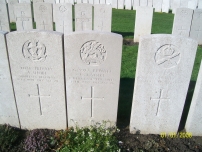| First Name: | Charles | Last Name: | RIVOIRE | |
|---|---|---|---|---|
| Date of Death: | 16/06/1917 | Lived/Born In: | Walthamstow | |
| Rank: | Private | Unit: | East Kent (Buffs)8 | |
| Memorial Site: | ||||
Current Information:Age-26 38, Buxton Road, Walthamstow Lijssenthoek Military Cemetery, Belgium
The Battle of Messines was a successful British offensive between 7th-14th June, 1917 that dislodged the German army from the Messines Ridge, a salient jutting into the British lines, that they had held since 1914. The front attacked ran south for nine miles from Mount Sorrel, through the villages of Messines and Wytschaete, down to Ploegsteert and its capture gave the British control of the high ground to the south of Ypres. This greatly facilitated their attack further north the following month which became known as the 3rd Battle of Ypres or Passchendaele. The success at Messines was a result of some careful planning and the explosion of nineteen large mines at 3.10am, zero hour, on 7th June, along the length of the ridge. Twenty two mine shafts had been constructed but one was discovered by the enemy and destroyed and two failed to explode. Nevertheless the resulting explosion was so loud that it could be heard in London and so powerful that 10.000 German soldiers were killed. Nine British, Australian and New Zealand divisions then attacked behind a creeping artillery barrage and all first day objectives were soon taken. Over the next few days German counter attacks were repelled and by 14th June the whole of the ridge had been captured. One of the final acts of the Battle of Messines took place on 14th June when, at 7.30pm, the 8th East Kent (Buffs) battalion of 17 Brigade, 24th Division, who had moved into the front line in Battle Wood during the previous evening, carried out an attack along with 12th Royal Fusiliers, on enemy positions on the northern face of the Spoil Bank and the nearby tram line. The Spoil Bank was a large mound of rubble or spoil that had been created during the construction of a nearby canal. Their attack was on a two company front behind a protective artillery barrage and very little resistance was met until A Company reached the Spoil Bank where there was a good deal of often savage hand to hand fighting which was brought to an end when two privates rushed a German machine-gun in a concrete emplacement which allowed the objective to be secured. C Company advanced along the tramline and suffered many casualties as they moved forward but eventually the objective was achieved and consolidated after which a platoon moved on a further sixty yards and cleared a system of dug-outs, bringing back four prisoners. D Company then came up and cleared the south side of the Spoil Bank. 8th Buffs dug-in and consolidated their new forward positions and remained there until the following evening when they were relieved. During 15th June they were machine-gunned by German planes and came under heavy and persistent shellfire particularly at 5pm when there was a very heavy enemy artillery barrage while at the same time their infantry were seen massing for an attack. This however was dispersed by 24th Division artillery. Charles Rivoire, who died from wounds on 16th June, was one of the casualties sustained by 8th Buffs during this operation. |
||||
| « Back to Search Results | ||||
| If you think any of the information shown here is incorrect, Click Here to submit your amends and comments | ||||




